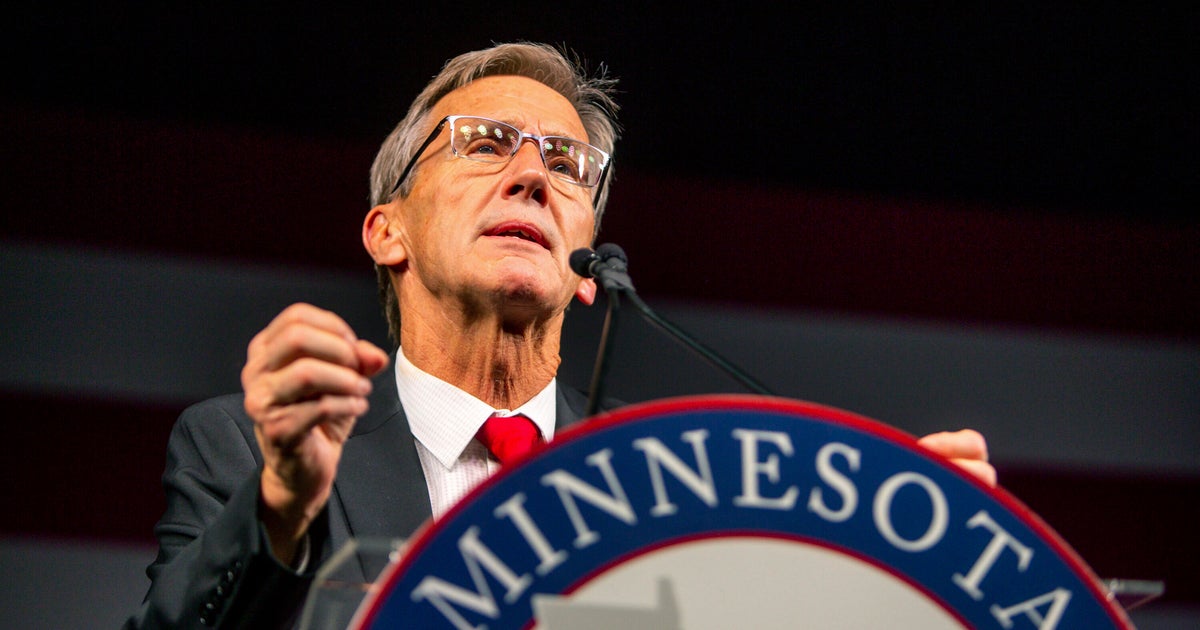North Carolina 2020 election results: Trump is projected winner
CBS News projects President Trump is the winner in North Carolina, based on additional reports now in from its counties. The president adds North Carolina's 15 electoral votes his tally, raising it to 232. President-elect Joe Biden has 306 electoral votes with his projected wins in Arizona and Georgia.
Democrat Cal Cunningham concedes North Carolina Senate race
Democratic candidate Cal Cunningham conceded the North Carolina Senate race to Republican Senator Thom Tillis, saying in a statement that he had called Tillis to congratulate him on his victory.
"The voters have spoken and I respect their decision. While the results of this election suggest there remain deep political divisions in our state and nation, the more complete story of our country lies in what unites us: our faith and sense of confidence in our democracy, our civic values and common humanity, our shared aspiration to care for one another, and our belief that we live in a country that does exceptional things," Cunningham said in a statement.
Although Cunningham and Tillis appeared to be neck-and-neck in polls leading up to the election, Cunningham's campaign was embroiled in scandal amid revelations of an extramarital affair. Tillis' campaign also had its own October surprise when the senator contracted coronavirus early in the month.
Cunningham's concession means that the balance of the Senate is now 49 Republicans to 48 Democrats. There are two that have advanced to runoff elections in January and will determine which party holds the majority. CBS News has not projected a winner in the Alaska Senate race, but it leans Republican, with incumbent Senator Dan Sullivan holding a 57,540 vote lead.
North Carolina is toss-up at poll close
According to early exit polls, President Trump and Biden are in a dead heat in North Carolina — a state that Mr. Trump won by 4 points in 2016 and Barack Obama won by 4 points in 2012.
This year, the party division among voters appears similar to 2016: 34% Democratic, 36% Republican, and 30% independent. Once again, partisans are favoring their own party's candidate by more than 95%. However, independents appear to have swung away from Mr. Trump.
In 2016, independent voters favored Mr. Trump, 53% to 37%. But this year, the exit polls suggest that independents are narrowly supporting Biden, 49% to 43%. If these numbers hold up, they could hold the key to a victory by Biden in the Tar Heel State.
By David R. Jones
CBS News estimates North Carolina is a toss-ups
CBS News estimates that the presidential race is a toss-up in North Carolina.
In the Senate, CBS News estimates North Carolina's race between Republican Thom Tillis and Democrat Cal Cunningham is a toss-up.
Biden winning independents in North Carolina
In a reversal from four years ago, Biden has an edge among independents in North Carolina, exit polling shows.
White women with college degrees are also giving Biden a boost in the Tarheel State. He leads this group that Mr. Trump won four years ago.
But White evangelicals make up a third of the electorate and they are overwhelmingly backing Mr. Trump. The president also continues to do well with White men without college degrees.
North Carolina extends voting at four polling sites
Four polling locations in North Carolina will remain open past the state's official poll closing time of 7:30 p.m. ET, the state's Board of Elections voted Tuesday. The extension will delay the battleground state's reporting of election results by 45 minutes, to 8:15 p.m. ET.
Four polling sites in three different counties across the state experienced various issues Tuesday morning, forcing them to pause operations or open late.
"With 2,660 polling sites, it is not unusual for minor issues to occur at polling sites that result in a brief disruption of voting," the board of elections said in a press release. "The State Board routinely meets to discuss the extension of hours when the need arises."
Varying delays in Cabarrus, Guilford, and Sampson counties prompted the board to issue specific extensions for each polling place. Voting was extended by 17 minutes, to 7:47 p.m., at a location in Cabarrus County, while voting was extended by 34 minutes, to 8:04 p.m., at a site in Guilford County. Two precincts that opened late in Sampson County are extended 45 minutes to 8:15 p.m.
If you are waiting in line when the polls close, stay in line, because you still have the right to vote. The American Civil Liberties Union has a full list of voting rights here.
Election Day
Polling places are open until 7:30 p.m and voters in line at their assigned polling place at 7:30 p.m. on November 3 will be able to vote. Mail-in ballots must be postmarked by November 3 but can be received through November 12, nine days after Election Day. By election eve, 4,550,963 had already voted, according to the U.S. Elections Project, close to the 4.7 million who voted in 2016 overall.
County election board staff begin processing absentee ballots five weeks before Election Day. According to the state board of elections, results won't be tabulated and reported until Election Day. However, the board also said in an email that it anticipates that 97% or more of all ballots cast in North Carolina will be reported by the end of election night, so unofficial results may nonetheless come in on the earlier side of election night unless the race is very close.
Remaining ballots, including provisional ballots and absentee by-mail ballots that arrive after Election Day, will be counted and added to the totals during the post-election canvass period.
State of the race
In 2016, Donald Trump won 76 of North Carolina's 100 counties; exit polls showed that Mr. Trump won White voters by more than 20 points, including White voters with college degrees by nearly 19 points. But this year, CBS News' October 25 Battleground Tracker poll showed Biden edging out Mr. Trump by 6 points among White voters with 4-year degrees in the state — 50% to 44%.
Six counties in North Carolina voted for Mr. Trump in 2016 after voting for President Obama in 2008 and 2012. One of those counties is Granville County, about 40 miles outside of Wake County, home to the capital city of Raleigh.
Political scientists say the changing demographic of the state could favor the playing field for Democrats this election. With a younger, more diverse cohort of voters moving to North Carolina from out of state, it remains to be seen whether this could give Democrats the upper hand. The state has also seen its population increase by more than 340,000 people. U.S. Census data estimates suggest that over 340,000 more people now live in North Carolina than in July of 2016.
Senate race
North Carolina's Senate race has arguably been one of the most watched contests among the battleground states in 2020. CBS News previously reported in October that Democratic challenger and veteran Cal Cunningham admitted to exchanging sexually suggestive texts with a political strategist who was not his wife, while incumbent Republican Senator Thom Tillis tested positive for COVID-19 after being photographed maskless at the White House Supreme Court nomination ceremony of Judge Amy Coney Barrett.
An October 25 CBS News poll shows Cunningham is still leading Senator Tillis, though by less than in September.
Cunningham reported raising $28.3 million in the third quarter and spent $30 million, while Tillis raised less than a fourth of Cunningham's haul but spent less than $7 million in the last quarter.
The issues
Coronavirus
By November 1, there were 276,692 confirmed cases of coronavirus reported in the state and 1,122 currently hospitalized according to the state's department of health; over 4 million tests have been completed.
In October, North Carolina entered Phase 3 of reopening, which in part allowed gaming establishments to reopen and permitted large outdoor facilities with a capacity of more than 10,000 guests to reopen at 7% of total seating capacity.
Democratic Governor Roy Cooper, who's up for reelection, is arguing that he's trying to reopen safely, while his opponent and Republican lieutenant governor, Dan Forrest, is accusing him of trying to keep the state locked down. A large-scale Republican National Convention was supposed to be held in North Carolina in August, but was ultimately pared down and limited to official party business as COVID cases spiked.
Jobs
North Carolina's unemployment rate in March 2020 was 4.3%, but the pandemic pushed it to a peak of 12.8% in May. By August, the unemployment rate in the state had dropped back down to 6.5% even though there are still roughly 300,000 less jobs than there were in March before the pandemic forced the state to shut down, according to the Bureau of Labor Statistics.
School re-openings
Outbreaks of coronavirus clusters at a North Carolina University made headlines shortly after Cooper announced in September that schools could reopen safely. Since then, schools have reopened and students have the option to participate in in-person or remote learning.
Education
Education equity and school choice are among the top issues for North Carolina voters.




